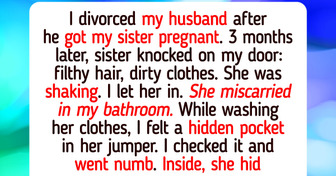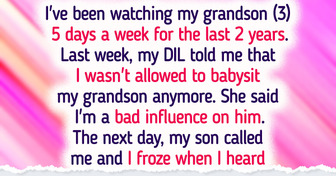My Girlfriend Humiliated Me Because I Helped a Coworker


Family conflict is something many of us face, especially when expectations clash between generations. Whether it’s about caregiving, financial support, or personal boundaries, navigating these issues can be emotionally charged. One of our readers gave her daughter everything, but when she brought up her retirement plans, the daughter’s shocking opinion changed everything.

Hi Bright Side,
I (56F) have one daughter, “Emily” (26F). I raised her alone after her dad passed away when she was six. I worked multiple jobs to give her everything—good schools, extracurriculars, even paid for her college and her first apartment so she could “start life debt-free.” I’ve always told her that family is about mutual care, especially as we age.
Last week, during a conversation about my retirement plans, I jokingly said something like, “When I’m old and wrinkly, I hope you’ll let me move in with you.” She laughed, but then turned serious and said, “Mom, I love you, but I’m not going to be your caregiver. I plan to live my own life, and I think it’s unfair for parents to expect that from their kids.”
I was stunned. I told her I never expected her to change my diapers, but I always thought there’d be some level of support—emotional if not physical. She doubled down, saying, “No Mom, the cycle of parental sacrifice doesn’t need to continue forever!” Then added, “But hey, I’d gladly visit you at the nursing home!”

After this conversation, I couldn’t stop thinking about it. I gave up a lot for her. I never remarried. I even delayed my retirement to fund her grad school, and I was planning to help her with a down payment for a condo next year...
I was heartbroken. Her words felt like a betrayal of everything I thought we had. So I decided to flip the script.
The next day, I called her and told her that in light of her clearly stated boundary, I will also be adjusting mine: I won’t be helping with her down payment. I told her I’ll always love her, but support goes both ways. She got angry, accused me of being manipulative, and said I’m punishing her for having boundaries.
Now, my sister says I “weaponized” my support and that I’m being petty. But I don’t see it that way—I’m simply aligning my future resources with the reality my daughter laid out. Am I in the wrong for doing that?
Sincerely
Martha
Thank you, Martha, for sharing this deeply challenging experience with us. We understand how shocked and heartbroken you must feel. To support you through this difficult time, we’ve crafted 4 thoughtful pieces of advice tailored to your situation.
Martha, it’s clear you poured your heart into raising Emily and hoped for a reciprocal kind of support as you age. But love and care can take many forms—not just cohabitation or hands-on caregiving.
Instead of making financial support contingent on future care, try having a calm conversation where you both define what “mutual care” means moving forward. Explain your emotional hurt without framing your decision as a transaction. That way, you’re setting boundaries based on respect, not retaliation.

This conflict has likely cracked some of the trust and emotional connection between you two. Rather than letting resentment grow, consider inviting Emily to have an open-hearted discussion—perhaps with a mediator or counselor if emotions run high.
Let her know how her words affected you, but also express curiosity about why she feels so strongly about not being a caregiver. You may discover fears, assumptions, or pressures she’s never voiced. Building understanding now could prevent deeper fractures later.
Emily’s desire to maintain independence isn’t a rejection of you, but a reflection of her generational values around boundaries and self-care. You can respect her stance while still honoring your own principles about reciprocal relationships.
It’s okay to reassess your plans, including how you allocate your resources—but try to do so from a place of self-alignment rather than reaction. Framing your financial decision as a re-prioritization for your own well-being may soften the impact. Ultimately, this is about both of you growing into adult roles, not just mother and child.

After years of sacrifice, it might be time to shift your energy inward and plan a retirement that centers your needs and joy. Instead of measuring your worth through Emily’s choices or commitments, consider how to create a support system that doesn’t rely on her. That might include long-term care planning, community building, or pursuing long-postponed dreams.
Reclaiming that part of your identity can be empowering—not spiteful. In doing so, you also model the kind of independent aging that Emily is striving for herself.
Family relationships can be both heartwarming and complicated—especially when meeting a partner’s family. One of our readers shared how her future MIL insulted her publicly... but she made her regret it. Discover her letter here.











